Unit 11 How was your school trip?单元考点精讲课件(52张PPT)
文档属性
| 名称 | Unit 11 How was your school trip?单元考点精讲课件(52张PPT) |  | |
| 格式 | pptx | ||
| 文件大小 | 1.7MB | ||
| 资源类型 | 试卷 | ||
| 版本资源 | 人教新目标(Go for it)版 | ||
| 科目 | 英语 | ||
| 更新时间 | 2023-01-29 21:27:23 | ||
图片预览

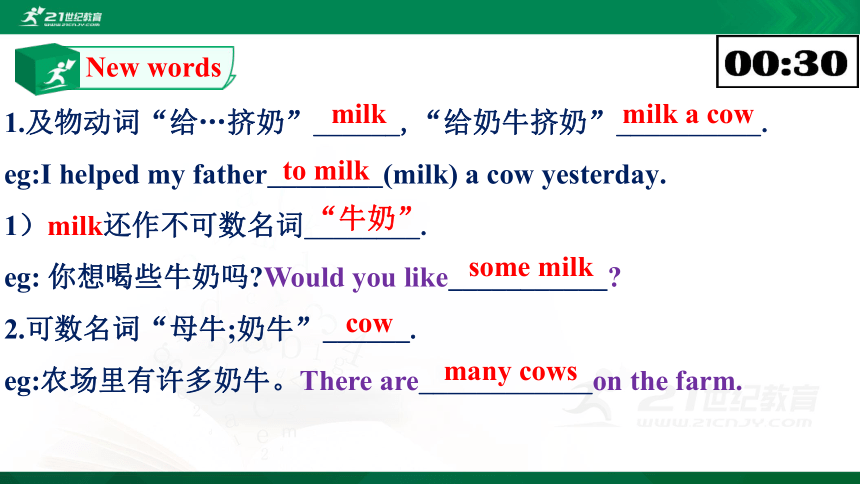
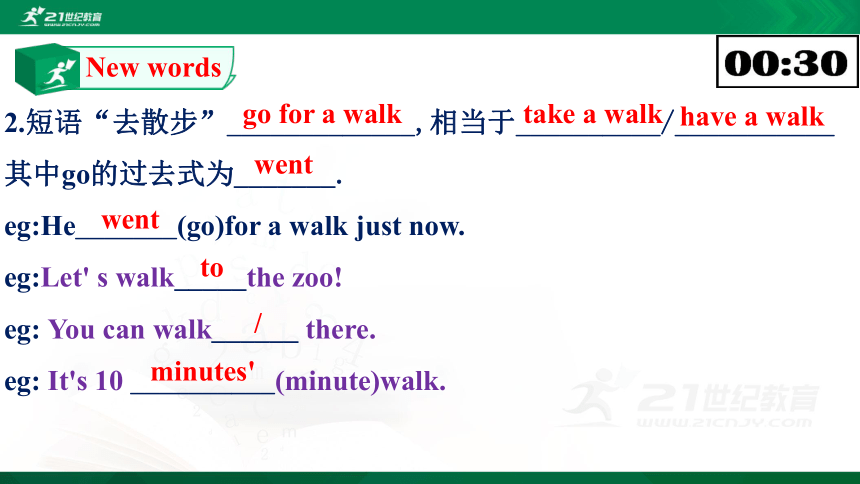
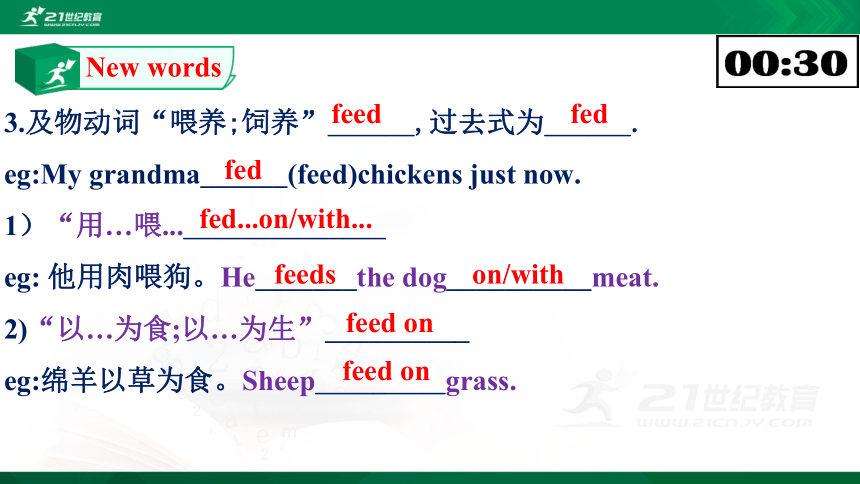
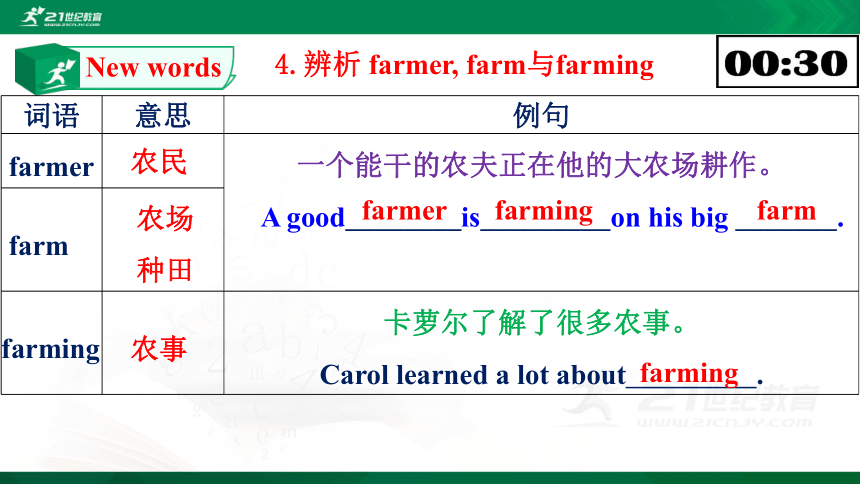
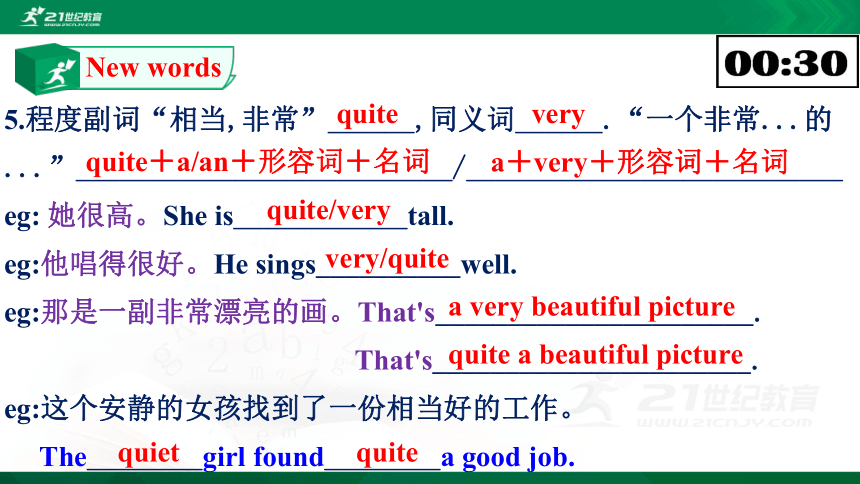
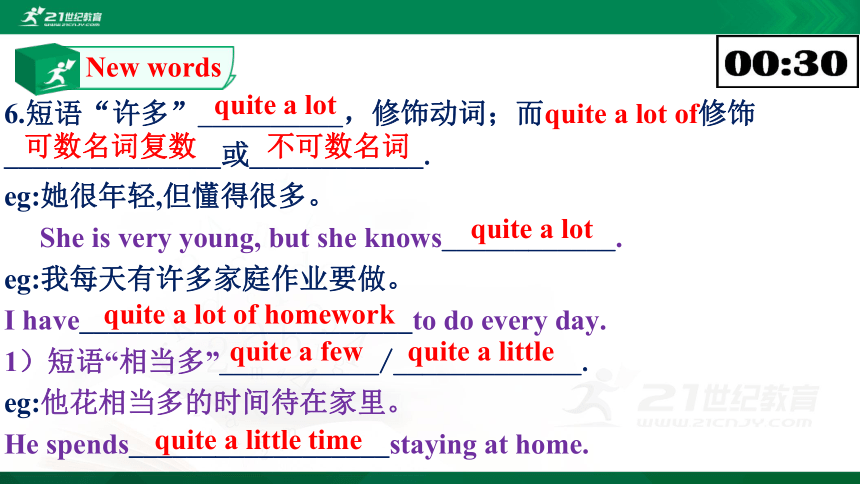
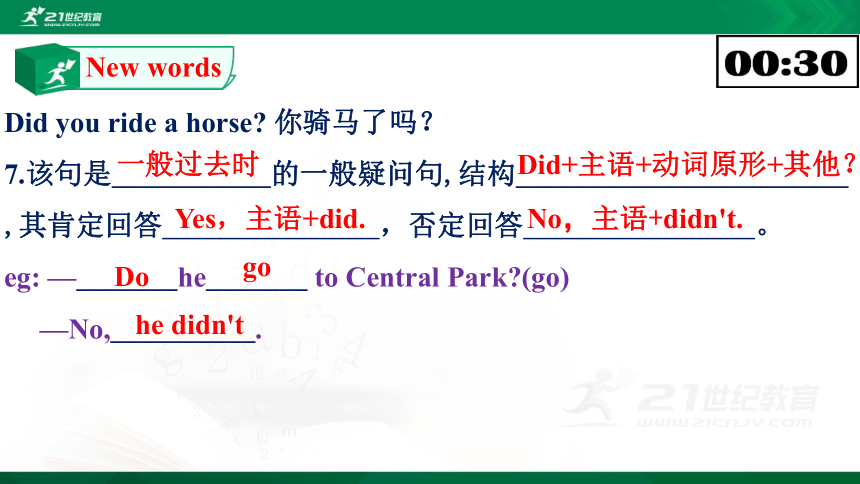
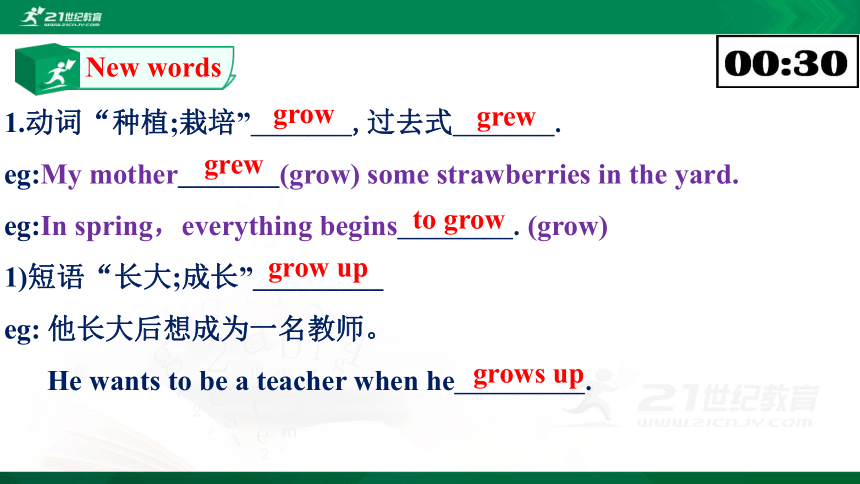
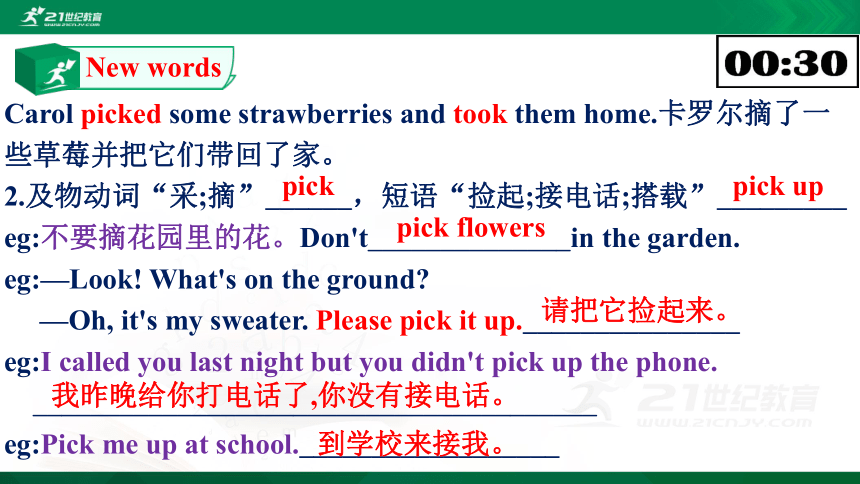
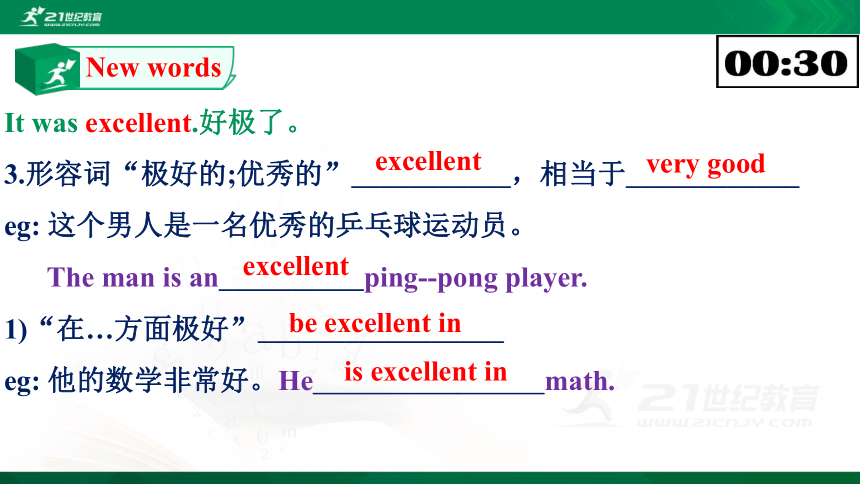
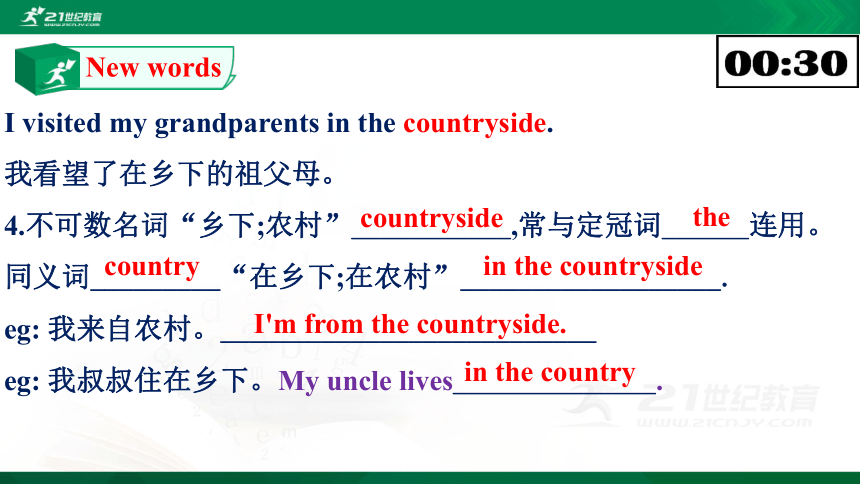
文档简介
(共52张PPT)
考点精讲
新目标(Go for it)版七年级下册
Unit 11 How was your school trip
1.及物动词“给…挤奶”______,“给奶牛挤奶”__________.
eg:I helped my father________(milk) a cow yesterday.
1)milk还作不可数名词________.
eg: 你想喝些牛奶吗 Would you like___________
2.可数名词“母牛;奶牛”______.
eg:农场里有许多奶牛。There are____________on the farm.
milk a cow
milk
to milk
“牛奶”
New words
some milk
cow
many cows
2.短语“去散步”_____________,相当于__________/___________
其中go的过去式为_______.
eg:He_______(go)for a walk just now.
eg:Let' s walk_____the zoo!
eg: You can walk______ there.
eg: It's 10 __________(minute)walk.
take a walk
go for a walk
have a walk
went
New words
went
to
/
minutes'
3.及物动词“喂养;饲养”______,过去式为______.
eg:My grandma______(feed)chickens just now.
1)“用…喂...______________
eg: 他用肉喂狗。He_______the dog__________meat.
2)“以…为食;以…为生”__________
eg:绵羊以草为食。Sheep_________grass.
fed
feed
fed
fed...on/with...
New words
feeds on/with
feed on
feed on
New words
4.辨析 farmer, farm与farming
词语 意思 例句
farmer 一个能干的农夫正在他的大农场耕作。
A good________is_________on his big _______.
farm farming 卡萝尔了解了很多农事。
Carol learned a lot about_________.
农民
农场
种田
farmer
farming
farm
农事
farming
5.程度副词“相当,非常”______,同义词______.“一个非常...的...”__________________________/__________________________
eg: 她很高。She is____________tall.
eg:他唱得很好。He sings__________well.
eg:那是一副非常漂亮的画。That's______________________.
That's______________________.
eg:这个安静的女孩找到了一份相当好的工作。
The________girl found________a good job.
very
quite
quite+a/an+形容词+名词
a+very+形容词+名词
New words
quite/very
very/quite
a very beautiful picture
quite a beautiful picture
quiet
quite
6.短语“许多”__________,修饰动词;而quite a lot of修饰
_______________或____________.
eg:她很年轻,但懂得很多。
She is very young, but she knows____________.
eg:我每天有许多家庭作业要做。
I have_______________________to do every day.
1)短语“相当多”___________/_____________.
eg:他花相当多的时间待在家里。
He spends__________________staying at home.
quite a lot
可数名词复数
不可数名词
New words
quite a lot
quite a lot of homework
quite a few
quite a little
quite a little time
Did you ride a horse 你骑马了吗?
7.该句是___________的一般疑问句,结构_______________________ ,其肯定回答_______________,否定回答________________。
eg: —_______he_______ to Central Park (go)
—No,__________.
Did+主语+动词原形+其他?
一般过去时
Yes,主语+did.
No,主语+didn't.
New words
Do
go
he didn't
1.动词“种植;栽培”_______,过去式_______.
eg:My mother_______(grow) some strawberries in the yard.
eg:In spring,everything begins________.(grow)
1)短语“长大;成长”_________
eg: 他长大后想成为一名教师。
He wants to be a teacher when he_________.
grew
grow
grew
to grow
New words
grow up
grows up
Carol picked some strawberries and took them home.卡罗尔摘了一些草莓并把它们带回了家。
2.及物动词“采;摘”______,短语“捡起;接电话;搭载”_________
eg:不要摘花园里的花。Don't______________in the garden.
eg:—Look! What's on the ground
—Oh, it's my sweater. Please pick it up._______________
eg:I called you last night but you didn't pick up the phone.
_______________________________________
eg:Pick me up at school.__________________
pick
pick up
pick flowers
New words
请把它捡起来。
我昨晚给你打电话了,你没有接电话。
到学校来接我。
It was excellent.好极了。
3.形容词“极好的;优秀的”___________,相当于____________
eg: 这个男人是一名优秀的乒乓球运动员。
The man is an__________ping- pong player.
1)“在…方面极好”_________________
eg: 他的数学非常好。He________________math.
very good
excellent
excellent
be excellent in
New words
is excellent in
I visited my grandparents in the countryside.
我看望了在乡下的祖父母。
4.不可数名词“乡下;农村”___________,常与定冠词______连用。
同义词_________“在乡下;在农村”__________________.
eg: 我来自农村。__________________________
eg: 我叔叔住在乡下。My uncle lives______________.
the
countryside
country
in the countryside
New words
I'm from the countryside.
in the country
5.复合不定代词“任何东西;任何事物”__________,用_________或_________.肯定句中用___________,表示请求等疑问句用________
eg:你学到了一些关于农事的东西吗?
Did you learn__________about farming
eg:他是一个盲人。他什么也看不到。
He is a blind.He can't see__________.
eg:你想要点儿喝的东西吗
Would you like__________to drink
否定句
anything
疑问句
something
New words
anything
something
anything
something
1)anything作主语,谓语用 ___________.
eg:任何东西都是免费的。Anything____free.
2)形容词修饰anything时应遵行___________
eg: 上周末你做了一些特别的事吗?
Did you do_________________last weekend
is
单数形式
“不行原则”
anything special
New words
6.“ 带领某人参观……”________________,后接参观的地点.
eg:王叔叔领我们参观了他的农场。
Uncle Wang_________us_________his farm.
eg:请把那件外套拿给我看看。 Please_______that coat_______me.
Please____________________.
eg:你有一支新钢笔,请给我看看它。
You have a new pen. Please________________.
showed around
show sb. around...
show to
show me that coat
show it to me
Language points
Carol learned a lot about farming.卡萝尔了解了很多农事。
7.“学习/了解/知道关于...”_______________.
eg: 我想学习更多关于电脑的知识。
I'd like to________a lot________computers.
“了解/知道/获悉”_______________.
eg:Mary想了解中国历史.Mary wants to___________Chinese history.
eg: 他很勤奋,我们应该向他学习.
He is hard-working. We should____________him.
learn about
learn...about...
learn about
learn about
New words
learn from
How was your trip last week 上周你的旅行怎么样
8.本句为______________的常用句型,其结构为______________
其答语常用:“好极了”______________“还可以.”______________
“还不错”_____________“很糟糕.”_____________
eg:她的假期过得怎么样 ____________her holiday
eg:还不错。It was __________.
How was...
询问某事情况
It was great.
It was OK.
New words
It was not bad.
It was terrible.
How was
not bad
I went fishing every day.我每天去钓鱼。
9.短语“去钓鱼”___________,属于___________类型的短语。
“去购物”______________“去游泳”______________
“去划船”______________“去滑冰”______________
“去野营”______________“去远足”______________
go+v-ing
go fishing
go shopping
go swimming
New words
go boating
go skating
go camping
go hiking
It was so much fun.我看望了在乡下的祖父母。
10.短语“如此多;这么多”__________,修饰___________或______。
eg: 教室里太吵了。There was___________noise in the classroom.
eg: 你说得太多了。You talked___________.
1)so many修饰________________。
在这个城市里,他有这么多朋友。He had_________friends in the city.
不可数名词
so much
动词
so much
New words
so much
可数名词复数
so many
Grammar
一般过去时
句子一般过去时, 表示________发生事。
谓语动词________, ___________作标志。
疑问句构成有方法, 主语前面_______加。
否定句也不难, 主语后面________添。
句中出现did/didn’t, 后面动词要_______。
过去
过去式
过去时间
did
didn’t
还原
规则动词过去式的变化
动词类别 构构方法 口诀 例子
一般动词 milk- ,pick - talk- , ,visit- ,climb- ,play-
以元音字母+y结尾的动词 以-e结尾的动词 live- ,dance- , arrive-,
,practice-
直接在词尾加-ed
直
加-d
加
milked
picked
talked
played
visited
climbed
lived
danced
arrived
practiced
Grammar
动名-ing的变化规则
动词类别 构构方法 口诀 例子
以重读闭音节结尾且末尾只有一个辅音字母的动词 stop- ,shop- ,plan
以“辅音字母+y”结尾的动词 study- , worry- ,
cry- carry- ...
双写这个辅音字母加-ed
双
变y为i,再加 ed
变
stopped
shopped
planned
cried
studied
worried
cry
Grammar
Grammar
动词过去式, 构成有规律;
一般情况下, 词尾加_____;
词尾若有-e, 直接加上_____;
“辅+y”作结尾, 变_____为_____加-ed;
一辅重读闭音节, 双写_____加-ed。
-ed
-d
-y
-i
辅音
Grammar
规则动词过去式词尾-ed的读音
读音规则 例 词 读 音
ed在清辅音后面 milked /m lkt/ stopped /st pt/
ed在浊辅音和元音后面 moved /mu:vd/ lived /l vd/
ed在t, d 后面 studied / st did/ started / st did/
/t/
/d/
/id/
①动词过去式与动词原形_______
let→_______,put→_______,cut→_______,read→_______
②遇见i改为_______读/ /
swim→_______,sing→_______,begin→_______,drink→_______,
sit→_______,give→_______
③把i变为_______读/ /
ride→_______,drive→_______,write→_______
let
一样
put
cut
Grammar
read
a
不规则动词过去式的构成
swam
sang
began
drank
sat
gave
o
rode
drove
wrote
④ow/aw变为_______读/u /
know→_______,grow→_______, throw→_______, draw→_______
⑤以d结尾的词,把d变成______
spend→_______,build→_______,lend→_______,send→_______
⑥含有双写字母e,去掉其中一个。读/e/
feed→_______, meet→_______
grew
ew
knew
threw
Grammar
t
drew
spent
built
lent
sent
fed
met
⑦中间去e末尾加_______
feel→_______, keep→_______, sleep →_______, sweep→_______
⑧过去式以_______和_______结尾的单词
bring→_______, buy→_______, think →_______, teach→_______
⑨be的过去式有两种形式,主语是第一、三人称单数用_______,其他用_______
Grammar
t
felt
kept
slept
swept
ought
aught
taught
brought
bought
thought
was
were
2. 一般过去时的时间状语:
(昨天)___________, (昨天早上)___________________, (前天) ________________________, (昨天晚上)___________, (上周) ___________, (两天前)______________,(刚刚)______________,
(刚才)___________,(in1980)_________________等。
eg:He always ________(go) to school by bus last month.
yesterday morning
yesterday
the day before yesterday
last night
Grammar
last week
two days ago
a moment ago
just now
in+过去的时间
went
①肯定句:_____________________
我们上周的学校旅行很糟糕。_________________________________
②否定句:_________________________________________
刚才学生们不在学校。The students__________at school just now.
③一般疑问句:_____________________
肯定回答: _____________________
否定回答: _____________________
Our school trip was terrible last week.
主语+ was/were+其他.
主语+ was not(wasn't)/were not(weren't)+其他.
weren’t
Grammar
Was/Were+主语+其他
含有be动词的一般过去时的句式
Yes,主语+was/were.
No,主语+wasn't/ weren't.
eg:昨天晚上你在家吗?______ ____ at home last night
不, 我不在家。 ____________________
④特殊疑问句:________________________________________
你的寒假怎么样 ______ _______your winter vacation
④特殊疑问句:______________________________(对主语提问)
昨天下午谁在教室 _____ ____in the classrome yesterday afternoon
No, I wasn’t.
Were you
疑问词+was/were+主语+其他
How was
Grammar
疑问词+was/were+其他
Who was
含有be动词的一般过去时的句式
①肯定句:_____________________
上周末我们去农场了。_________________________________
②否定句:_________________________________________
汤姆今天上午没去上班。Tom______ ____to work this morning.
③一般疑问句:_________________________
肯定回答: _____________________
否定回答: _____________________
We went to the farm last weekend.
主语+动词过去式+其他.
主语 did not(didn't)+动词原形+其他.
didn't go
Grammar
Did+主语+动词原形+其他
含实义动词的一般过去时的句式
Yes,主语+did.
No,主语+didn't.
eg:She did homework with her friends.(改为一般疑问句)
______she ______chores with her parents
④特殊疑问句:________________________________________
I went to the mountain yesterday.(对划线部分提问)
_______did you_______yesterday?
④特殊疑问句:______________________________(对主语提问)
谁和你去的那儿?_____ ______there with you
Did do
疑问词+did+主语+动词原形+其他
What do
Grammar
疑问词+动词过去式+其他
Who went
含实义动词的一般过去时的句式
We worried it would rain.我们担心将下雨。
8.本句为含有___________的主从复合句。
如果主句的时态为___________,从句要用相应的_______时态。主句中worried为________的过去式,从句中 would为_______的过去式。
eg: I always_________(worry)that I couldn't pass the exam.
9.“使某人担心”__________
eg: Nothing_________(worry) me.
一般过去时
宾语从句
过去
worry
New words
will
worried
worry sb.
worries
1).worry还作不及物动词,形容词_________,“担心...”___________相当于__________________
eg:不必为我担心,我马上就回来。
Don't________ ______me. I'll be back soon.
eg:我担心即将到来的考试。I____ _______ _____the coming exam.
eg:— Jack. I’m going to work. Please look after yourself.
— _______________, Dad. I will.
worry about
worried
be worried about
worry about
New words
am worried about
Don’t worry
Luckily, it didn't, and the sun came out again!
2.副词“幸运地”________,通常放在______,用来修饰整个句子。
eg:__________(lucky), we got on the bus in time.
eg:John is _________(luck)get some free pancakes.
eg:祝你好运!___________________
luckily
句首
New words
Luckily
lucky
Good luck to you!
2.名词“太阳”______,为独一无二的事物,其前要加定冠词______,类似的名词还有“月亮”_______, “地球”_______等。
eg: 阳光照耀,鸟儿唱歌。
______ ______is shining and birds are singing.
the
sun
moon
earth
New words
The sun
2.come out意为_________________________________
eg:The rain stopped and the sun came out._______________________
eg:The flowers come out in spring.__________________________
eg:Her new novel will come out this month.
____________________________
eg:The truth came out at last.__________________________
雨停后太阳出来了。
“出来”;“盛开”;出版;“被获知”
花儿春天开放。
他的新小说将于这个月出版。
New words
最后真相大白了。
1.物质名词“火”______,还作可数名词________.
eg:Don't play with_______, because it's very dangerous.
eg:The factory was on fire yesterday.__________________________
eg:You put up the tend and I'll make a fire .______________________
eg:Those firemen put up the fire in the forest.
___________________________
“火灾”
fire
fire
昨天那家工厂着火了。
New words
你搭帐篷,我来生火。
那些消防员扑灭了森林火灾。
2.可数名词“油画”________,动词“绘画;给…上油漆”______,名词“画家;油漆工”________.
eg:He painted the wall red.__________________________
painting
paint
New words
painter
他把墙漆成了红色。
New words
1.辨析exciting与 excited
词语 词性 意思 用法 例句
exciting 它是令人兴奋的一天。 It was an__________day.
这个新闻令人激动。
The news is__________.
excited Everyone was__________when they heard the__________news.
使人兴奋的;令人激动的
修饰物
形容词
感到兴奋的
修饰人
exciting
exciting
exciting
excited
New words
类似exciting与excited的词还有:
修饰物 修饰人
有趣的 感兴趣的
令人吃惊的 惊讶的
令人厌倦的 厌倦的
令人困倦的 疲倦的
interesting
interested
surprising
boring
surprised
bored
tiring
tired
2.可数名词,意为“价格”______,常见短语________________,意为_____________,表示价格的高低用______或_____;表示物品贵或便宜用___________或_______
eg:这辆车的价格很高。_____________________________
这辆车很贵。 ______________________________
这本书的价格很低。___________________________________
这本书很便宜。 ______________________________
price
the price of sth.
high
low
Review
“某物的价格”
expensive
cheap
The price of the car is very high.
The car is very expensive.
The price of the book is very low.
The book is very cheap.
Today I went on a school trip.今天我参加了学校旅行。
3.短语“去旅行”____________,相当于___________,"去......旅行"
________________.
eg: 他去纽约旅行了。He________________to New York.
1)go on 常使用的短语,意为“去……”
去远足________________ 去野餐________________
去访问________________ 去度假________________
go on a trip
have a trip
New words
go on a trip to...
went on a trip
go on a hike
go on a picnic
go on a visit
go on a vacation
Then the guide taught us how to make a model robot.然后,导游教我们怎样制作机器人模型。
4.本句中how to make a model robot为_________________________结构,在句中看作一个整体,作taught的直接宾语。
eg: 我不知道如何去银行。I don't know_______________________.
eg: 我想知道首先做什么。I want to know______________first.
让我教你如何使用电脑.Let me teach you____________the computer.
I think today's school trip was terrible.
"特殊疑问词+动词不定式"
how to get to the bank
New words
what to do
how to use
5.及物动词,“教”_____,第三人称单数________,名词_________.
1)“教某人某事”_____________=____________________
eg:他教我们英语。_______________________________
2)“教某人做某事”__________________
eg:我姐姐教我弹钢琴。_______________________________
3)“自学”_____________相当于_________________
eg:Mary teaches herself English.____________________________.
Review
teach
teaches
teach sb. sth.
teacher
teach sth. to sb.
He teaches us English.
teach sb. to do sth.
My sister teaches me to play the piano.
teach oneself
learn by oneself
Mary learns English by herself
After that,I went to the gift shop and bought some lovely gifts for my parents.之后,我去了礼品店并为父母买了一些可爱的礼物。
6.可数名词_______,同义词__________
eg: We'd better buy some________for the children.
7.形容词"可爱的" _______,类似“友好的” ________
eg: 多么可爱的女孩!What a_______girl!
8.可数名词“导游;向导”_________,作动词_________
导游正带领我们穿森林。The______is________us through the forest.
gift
present
New words
gifts
lovely
friendly
lovely
guide
“带领”
guide
guiding
All in all,it was an exciting day.总的说来,这是令人兴奋的一天。
9.短语“总的说来”_________,常放在句首,(总之)___________,
(简而言之)__________.
eg: —How was your trip —____________ , it was great.
1)短语"总共;合计"_________
eg:There are fifty students in all.________________________
all in all
in a word
in short
All in all
in all
总共有50名学生。
Main points
It was so hot on the slow train.慢车上太热了。
10.形容词“缓慢的;迟缓的”______,反义词"快速的"______,slow的副词形式"缓慢地"________.
eg: 这列火车真的很慢,但那列很快。
This train is really_______,but that one is_______.
eg:Drivers should drive _______when they are passing by a school.
slow
fast
New words
slowly
slow
fast
slowly
Everything was about robots and I'm not interested in that.
一切都是关于机器人的,我对那方面不感兴趣。
11.复合不定代词“所有事物,一切”__________,作主语时,谓语动词用_______。
eg:Don't worry. Everything_______well.(go)
12.I'm_________in an__________film.我对一部有趣的电影感兴趣
“对做某事感兴趣”_______________________
eg:Lisa is interested in___________.(dance)
everything
单数
New words
goes
interested
interesting
be interested in doing sth
dancing
The rooms were really dark and it was difficult to take photos,so I didn't take any.房间很暗并且拍照很难,因此我一张都没拍。
13.形容词“黑暗的”_______,反义词“光明的”_______。
dark还意为______________,反义词_______。
eg:The house is quite dark inside._______________________
eg:I don't like the dark blue sweater.I like the light green one.
______________________________________________
dark
bright
New words
“(颜色)深的”
light
房子里面十分阴暗。
我不喜欢这件深蓝色的毛衣。我喜欢那件浅绿色的。
There were also too many people and I couldn't really see or hear the guide.而且,人太多,我看不到导游,也听不清导游的解说
14.及物动词“听到;听见”_______,过去式_______。
eg:Tom________carefully ,but he can’t_______anything.
1)“听见某人做了某事”_____________________
eg:I often hear her_______in the next room. (sing)
2)“听到某人正在做某事”_____________________
eg:I heard them__________when I passed his house.(sing)
hear
heard
New words
listens
hear
hear sb.do sth.
sing
hear sb. doing sth.
singing
I didn't like the trip at all.我一点儿都不喜欢这次旅行。
15.短语“一点儿也不”____________.
eg: I don't like eating meat at all.___________________________
1)Not at all.用来回答别人对你的_____,意为____________________
eg: —Thank you very much. 非常感谢。
—_____________不用谢。
not...at all
我一点儿都不喜欢吃肉。
感谢
"不客气,不用谢"
Not at all.
Main points
考点精讲
新目标(Go for it)版七年级下册
Unit 11 How was your school trip
1.及物动词“给…挤奶”______,“给奶牛挤奶”__________.
eg:I helped my father________(milk) a cow yesterday.
1)milk还作不可数名词________.
eg: 你想喝些牛奶吗 Would you like___________
2.可数名词“母牛;奶牛”______.
eg:农场里有许多奶牛。There are____________on the farm.
milk a cow
milk
to milk
“牛奶”
New words
some milk
cow
many cows
2.短语“去散步”_____________,相当于__________/___________
其中go的过去式为_______.
eg:He_______(go)for a walk just now.
eg:Let' s walk_____the zoo!
eg: You can walk______ there.
eg: It's 10 __________(minute)walk.
take a walk
go for a walk
have a walk
went
New words
went
to
/
minutes'
3.及物动词“喂养;饲养”______,过去式为______.
eg:My grandma______(feed)chickens just now.
1)“用…喂...______________
eg: 他用肉喂狗。He_______the dog__________meat.
2)“以…为食;以…为生”__________
eg:绵羊以草为食。Sheep_________grass.
fed
feed
fed
fed...on/with...
New words
feeds on/with
feed on
feed on
New words
4.辨析 farmer, farm与farming
词语 意思 例句
farmer 一个能干的农夫正在他的大农场耕作。
A good________is_________on his big _______.
farm farming 卡萝尔了解了很多农事。
Carol learned a lot about_________.
农民
农场
种田
farmer
farming
farm
农事
farming
5.程度副词“相当,非常”______,同义词______.“一个非常...的...”__________________________/__________________________
eg: 她很高。She is____________tall.
eg:他唱得很好。He sings__________well.
eg:那是一副非常漂亮的画。That's______________________.
That's______________________.
eg:这个安静的女孩找到了一份相当好的工作。
The________girl found________a good job.
very
quite
quite+a/an+形容词+名词
a+very+形容词+名词
New words
quite/very
very/quite
a very beautiful picture
quite a beautiful picture
quiet
quite
6.短语“许多”__________,修饰动词;而quite a lot of修饰
_______________或____________.
eg:她很年轻,但懂得很多。
She is very young, but she knows____________.
eg:我每天有许多家庭作业要做。
I have_______________________to do every day.
1)短语“相当多”___________/_____________.
eg:他花相当多的时间待在家里。
He spends__________________staying at home.
quite a lot
可数名词复数
不可数名词
New words
quite a lot
quite a lot of homework
quite a few
quite a little
quite a little time
Did you ride a horse 你骑马了吗?
7.该句是___________的一般疑问句,结构_______________________ ,其肯定回答_______________,否定回答________________。
eg: —_______he_______ to Central Park (go)
—No,__________.
Did+主语+动词原形+其他?
一般过去时
Yes,主语+did.
No,主语+didn't.
New words
Do
go
he didn't
1.动词“种植;栽培”_______,过去式_______.
eg:My mother_______(grow) some strawberries in the yard.
eg:In spring,everything begins________.(grow)
1)短语“长大;成长”_________
eg: 他长大后想成为一名教师。
He wants to be a teacher when he_________.
grew
grow
grew
to grow
New words
grow up
grows up
Carol picked some strawberries and took them home.卡罗尔摘了一些草莓并把它们带回了家。
2.及物动词“采;摘”______,短语“捡起;接电话;搭载”_________
eg:不要摘花园里的花。Don't______________in the garden.
eg:—Look! What's on the ground
—Oh, it's my sweater. Please pick it up._______________
eg:I called you last night but you didn't pick up the phone.
_______________________________________
eg:Pick me up at school.__________________
pick
pick up
pick flowers
New words
请把它捡起来。
我昨晚给你打电话了,你没有接电话。
到学校来接我。
It was excellent.好极了。
3.形容词“极好的;优秀的”___________,相当于____________
eg: 这个男人是一名优秀的乒乓球运动员。
The man is an__________ping- pong player.
1)“在…方面极好”_________________
eg: 他的数学非常好。He________________math.
very good
excellent
excellent
be excellent in
New words
is excellent in
I visited my grandparents in the countryside.
我看望了在乡下的祖父母。
4.不可数名词“乡下;农村”___________,常与定冠词______连用。
同义词_________“在乡下;在农村”__________________.
eg: 我来自农村。__________________________
eg: 我叔叔住在乡下。My uncle lives______________.
the
countryside
country
in the countryside
New words
I'm from the countryside.
in the country
5.复合不定代词“任何东西;任何事物”__________,用_________或_________.肯定句中用___________,表示请求等疑问句用________
eg:你学到了一些关于农事的东西吗?
Did you learn__________about farming
eg:他是一个盲人。他什么也看不到。
He is a blind.He can't see__________.
eg:你想要点儿喝的东西吗
Would you like__________to drink
否定句
anything
疑问句
something
New words
anything
something
anything
something
1)anything作主语,谓语用 ___________.
eg:任何东西都是免费的。Anything____free.
2)形容词修饰anything时应遵行___________
eg: 上周末你做了一些特别的事吗?
Did you do_________________last weekend
is
单数形式
“不行原则”
anything special
New words
6.“ 带领某人参观……”________________,后接参观的地点.
eg:王叔叔领我们参观了他的农场。
Uncle Wang_________us_________his farm.
eg:请把那件外套拿给我看看。 Please_______that coat_______me.
Please____________________.
eg:你有一支新钢笔,请给我看看它。
You have a new pen. Please________________.
showed around
show sb. around...
show to
show me that coat
show it to me
Language points
Carol learned a lot about farming.卡萝尔了解了很多农事。
7.“学习/了解/知道关于...”_______________.
eg: 我想学习更多关于电脑的知识。
I'd like to________a lot________computers.
“了解/知道/获悉”_______________.
eg:Mary想了解中国历史.Mary wants to___________Chinese history.
eg: 他很勤奋,我们应该向他学习.
He is hard-working. We should____________him.
learn about
learn...about...
learn about
learn about
New words
learn from
How was your trip last week 上周你的旅行怎么样
8.本句为______________的常用句型,其结构为______________
其答语常用:“好极了”______________“还可以.”______________
“还不错”_____________“很糟糕.”_____________
eg:她的假期过得怎么样 ____________her holiday
eg:还不错。It was __________.
How was...
询问某事情况
It was great.
It was OK.
New words
It was not bad.
It was terrible.
How was
not bad
I went fishing every day.我每天去钓鱼。
9.短语“去钓鱼”___________,属于___________类型的短语。
“去购物”______________“去游泳”______________
“去划船”______________“去滑冰”______________
“去野营”______________“去远足”______________
go+v-ing
go fishing
go shopping
go swimming
New words
go boating
go skating
go camping
go hiking
It was so much fun.我看望了在乡下的祖父母。
10.短语“如此多;这么多”__________,修饰___________或______。
eg: 教室里太吵了。There was___________noise in the classroom.
eg: 你说得太多了。You talked___________.
1)so many修饰________________。
在这个城市里,他有这么多朋友。He had_________friends in the city.
不可数名词
so much
动词
so much
New words
so much
可数名词复数
so many
Grammar
一般过去时
句子一般过去时, 表示________发生事。
谓语动词________, ___________作标志。
疑问句构成有方法, 主语前面_______加。
否定句也不难, 主语后面________添。
句中出现did/didn’t, 后面动词要_______。
过去
过去式
过去时间
did
didn’t
还原
规则动词过去式的变化
动词类别 构构方法 口诀 例子
一般动词 milk- ,pick - talk- , ,visit- ,climb- ,play-
以元音字母+y结尾的动词 以-e结尾的动词 live- ,dance- , arrive-,
,practice-
直接在词尾加-ed
直
加-d
加
milked
picked
talked
played
visited
climbed
lived
danced
arrived
practiced
Grammar
动名-ing的变化规则
动词类别 构构方法 口诀 例子
以重读闭音节结尾且末尾只有一个辅音字母的动词 stop- ,shop- ,plan
以“辅音字母+y”结尾的动词 study- , worry- ,
cry- carry- ...
双写这个辅音字母加-ed
双
变y为i,再加 ed
变
stopped
shopped
planned
cried
studied
worried
cry
Grammar
Grammar
动词过去式, 构成有规律;
一般情况下, 词尾加_____;
词尾若有-e, 直接加上_____;
“辅+y”作结尾, 变_____为_____加-ed;
一辅重读闭音节, 双写_____加-ed。
-ed
-d
-y
-i
辅音
Grammar
规则动词过去式词尾-ed的读音
读音规则 例 词 读 音
ed在清辅音后面 milked /m lkt/ stopped /st pt/
ed在浊辅音和元音后面 moved /mu:vd/ lived /l vd/
ed在t, d 后面 studied / st did/ started / st did/
/t/
/d/
/id/
①动词过去式与动词原形_______
let→_______,put→_______,cut→_______,read→_______
②遇见i改为_______读/ /
swim→_______,sing→_______,begin→_______,drink→_______,
sit→_______,give→_______
③把i变为_______读/ /
ride→_______,drive→_______,write→_______
let
一样
put
cut
Grammar
read
a
不规则动词过去式的构成
swam
sang
began
drank
sat
gave
o
rode
drove
wrote
④ow/aw变为_______读/u /
know→_______,grow→_______, throw→_______, draw→_______
⑤以d结尾的词,把d变成______
spend→_______,build→_______,lend→_______,send→_______
⑥含有双写字母e,去掉其中一个。读/e/
feed→_______, meet→_______
grew
ew
knew
threw
Grammar
t
drew
spent
built
lent
sent
fed
met
⑦中间去e末尾加_______
feel→_______, keep→_______, sleep →_______, sweep→_______
⑧过去式以_______和_______结尾的单词
bring→_______, buy→_______, think →_______, teach→_______
⑨be的过去式有两种形式,主语是第一、三人称单数用_______,其他用_______
Grammar
t
felt
kept
slept
swept
ought
aught
taught
brought
bought
thought
was
were
2. 一般过去时的时间状语:
(昨天)___________, (昨天早上)___________________, (前天) ________________________, (昨天晚上)___________, (上周) ___________, (两天前)______________,(刚刚)______________,
(刚才)___________,(in1980)_________________等。
eg:He always ________(go) to school by bus last month.
yesterday morning
yesterday
the day before yesterday
last night
Grammar
last week
two days ago
a moment ago
just now
in+过去的时间
went
①肯定句:_____________________
我们上周的学校旅行很糟糕。_________________________________
②否定句:_________________________________________
刚才学生们不在学校。The students__________at school just now.
③一般疑问句:_____________________
肯定回答: _____________________
否定回答: _____________________
Our school trip was terrible last week.
主语+ was/were+其他.
主语+ was not(wasn't)/were not(weren't)+其他.
weren’t
Grammar
Was/Were+主语+其他
含有be动词的一般过去时的句式
Yes,主语+was/were.
No,主语+wasn't/ weren't.
eg:昨天晚上你在家吗?______ ____ at home last night
不, 我不在家。 ____________________
④特殊疑问句:________________________________________
你的寒假怎么样 ______ _______your winter vacation
④特殊疑问句:______________________________(对主语提问)
昨天下午谁在教室 _____ ____in the classrome yesterday afternoon
No, I wasn’t.
Were you
疑问词+was/were+主语+其他
How was
Grammar
疑问词+was/were+其他
Who was
含有be动词的一般过去时的句式
①肯定句:_____________________
上周末我们去农场了。_________________________________
②否定句:_________________________________________
汤姆今天上午没去上班。Tom______ ____to work this morning.
③一般疑问句:_________________________
肯定回答: _____________________
否定回答: _____________________
We went to the farm last weekend.
主语+动词过去式+其他.
主语 did not(didn't)+动词原形+其他.
didn't go
Grammar
Did+主语+动词原形+其他
含实义动词的一般过去时的句式
Yes,主语+did.
No,主语+didn't.
eg:She did homework with her friends.(改为一般疑问句)
______she ______chores with her parents
④特殊疑问句:________________________________________
I went to the mountain yesterday.(对划线部分提问)
_______did you_______yesterday?
④特殊疑问句:______________________________(对主语提问)
谁和你去的那儿?_____ ______there with you
Did do
疑问词+did+主语+动词原形+其他
What do
Grammar
疑问词+动词过去式+其他
Who went
含实义动词的一般过去时的句式
We worried it would rain.我们担心将下雨。
8.本句为含有___________的主从复合句。
如果主句的时态为___________,从句要用相应的_______时态。主句中worried为________的过去式,从句中 would为_______的过去式。
eg: I always_________(worry)that I couldn't pass the exam.
9.“使某人担心”__________
eg: Nothing_________(worry) me.
一般过去时
宾语从句
过去
worry
New words
will
worried
worry sb.
worries
1).worry还作不及物动词,形容词_________,“担心...”___________相当于__________________
eg:不必为我担心,我马上就回来。
Don't________ ______me. I'll be back soon.
eg:我担心即将到来的考试。I____ _______ _____the coming exam.
eg:— Jack. I’m going to work. Please look after yourself.
— _______________, Dad. I will.
worry about
worried
be worried about
worry about
New words
am worried about
Don’t worry
Luckily, it didn't, and the sun came out again!
2.副词“幸运地”________,通常放在______,用来修饰整个句子。
eg:__________(lucky), we got on the bus in time.
eg:John is _________(luck)get some free pancakes.
eg:祝你好运!___________________
luckily
句首
New words
Luckily
lucky
Good luck to you!
2.名词“太阳”______,为独一无二的事物,其前要加定冠词______,类似的名词还有“月亮”_______, “地球”_______等。
eg: 阳光照耀,鸟儿唱歌。
______ ______is shining and birds are singing.
the
sun
moon
earth
New words
The sun
2.come out意为_________________________________
eg:The rain stopped and the sun came out._______________________
eg:The flowers come out in spring.__________________________
eg:Her new novel will come out this month.
____________________________
eg:The truth came out at last.__________________________
雨停后太阳出来了。
“出来”;“盛开”;出版;“被获知”
花儿春天开放。
他的新小说将于这个月出版。
New words
最后真相大白了。
1.物质名词“火”______,还作可数名词________.
eg:Don't play with_______, because it's very dangerous.
eg:The factory was on fire yesterday.__________________________
eg:You put up the tend and I'll make a fire .______________________
eg:Those firemen put up the fire in the forest.
___________________________
“火灾”
fire
fire
昨天那家工厂着火了。
New words
你搭帐篷,我来生火。
那些消防员扑灭了森林火灾。
2.可数名词“油画”________,动词“绘画;给…上油漆”______,名词“画家;油漆工”________.
eg:He painted the wall red.__________________________
painting
paint
New words
painter
他把墙漆成了红色。
New words
1.辨析exciting与 excited
词语 词性 意思 用法 例句
exciting 它是令人兴奋的一天。 It was an__________day.
这个新闻令人激动。
The news is__________.
excited Everyone was__________when they heard the__________news.
使人兴奋的;令人激动的
修饰物
形容词
感到兴奋的
修饰人
exciting
exciting
exciting
excited
New words
类似exciting与excited的词还有:
修饰物 修饰人
有趣的 感兴趣的
令人吃惊的 惊讶的
令人厌倦的 厌倦的
令人困倦的 疲倦的
interesting
interested
surprising
boring
surprised
bored
tiring
tired
2.可数名词,意为“价格”______,常见短语________________,意为_____________,表示价格的高低用______或_____;表示物品贵或便宜用___________或_______
eg:这辆车的价格很高。_____________________________
这辆车很贵。 ______________________________
这本书的价格很低。___________________________________
这本书很便宜。 ______________________________
price
the price of sth.
high
low
Review
“某物的价格”
expensive
cheap
The price of the car is very high.
The car is very expensive.
The price of the book is very low.
The book is very cheap.
Today I went on a school trip.今天我参加了学校旅行。
3.短语“去旅行”____________,相当于___________,"去......旅行"
________________.
eg: 他去纽约旅行了。He________________to New York.
1)go on 常使用的短语,意为“去……”
去远足________________ 去野餐________________
去访问________________ 去度假________________
go on a trip
have a trip
New words
go on a trip to...
went on a trip
go on a hike
go on a picnic
go on a visit
go on a vacation
Then the guide taught us how to make a model robot.然后,导游教我们怎样制作机器人模型。
4.本句中how to make a model robot为_________________________结构,在句中看作一个整体,作taught的直接宾语。
eg: 我不知道如何去银行。I don't know_______________________.
eg: 我想知道首先做什么。I want to know______________first.
让我教你如何使用电脑.Let me teach you____________the computer.
I think today's school trip was terrible.
"特殊疑问词+动词不定式"
how to get to the bank
New words
what to do
how to use
5.及物动词,“教”_____,第三人称单数________,名词_________.
1)“教某人某事”_____________=____________________
eg:他教我们英语。_______________________________
2)“教某人做某事”__________________
eg:我姐姐教我弹钢琴。_______________________________
3)“自学”_____________相当于_________________
eg:Mary teaches herself English.____________________________.
Review
teach
teaches
teach sb. sth.
teacher
teach sth. to sb.
He teaches us English.
teach sb. to do sth.
My sister teaches me to play the piano.
teach oneself
learn by oneself
Mary learns English by herself
After that,I went to the gift shop and bought some lovely gifts for my parents.之后,我去了礼品店并为父母买了一些可爱的礼物。
6.可数名词_______,同义词__________
eg: We'd better buy some________for the children.
7.形容词"可爱的" _______,类似“友好的” ________
eg: 多么可爱的女孩!What a_______girl!
8.可数名词“导游;向导”_________,作动词_________
导游正带领我们穿森林。The______is________us through the forest.
gift
present
New words
gifts
lovely
friendly
lovely
guide
“带领”
guide
guiding
All in all,it was an exciting day.总的说来,这是令人兴奋的一天。
9.短语“总的说来”_________,常放在句首,(总之)___________,
(简而言之)__________.
eg: —How was your trip —____________ , it was great.
1)短语"总共;合计"_________
eg:There are fifty students in all.________________________
all in all
in a word
in short
All in all
in all
总共有50名学生。
Main points
It was so hot on the slow train.慢车上太热了。
10.形容词“缓慢的;迟缓的”______,反义词"快速的"______,slow的副词形式"缓慢地"________.
eg: 这列火车真的很慢,但那列很快。
This train is really_______,but that one is_______.
eg:Drivers should drive _______when they are passing by a school.
slow
fast
New words
slowly
slow
fast
slowly
Everything was about robots and I'm not interested in that.
一切都是关于机器人的,我对那方面不感兴趣。
11.复合不定代词“所有事物,一切”__________,作主语时,谓语动词用_______。
eg:Don't worry. Everything_______well.(go)
12.I'm_________in an__________film.我对一部有趣的电影感兴趣
“对做某事感兴趣”_______________________
eg:Lisa is interested in___________.(dance)
everything
单数
New words
goes
interested
interesting
be interested in doing sth
dancing
The rooms were really dark and it was difficult to take photos,so I didn't take any.房间很暗并且拍照很难,因此我一张都没拍。
13.形容词“黑暗的”_______,反义词“光明的”_______。
dark还意为______________,反义词_______。
eg:The house is quite dark inside._______________________
eg:I don't like the dark blue sweater.I like the light green one.
______________________________________________
dark
bright
New words
“(颜色)深的”
light
房子里面十分阴暗。
我不喜欢这件深蓝色的毛衣。我喜欢那件浅绿色的。
There were also too many people and I couldn't really see or hear the guide.而且,人太多,我看不到导游,也听不清导游的解说
14.及物动词“听到;听见”_______,过去式_______。
eg:Tom________carefully ,but he can’t_______anything.
1)“听见某人做了某事”_____________________
eg:I often hear her_______in the next room. (sing)
2)“听到某人正在做某事”_____________________
eg:I heard them__________when I passed his house.(sing)
hear
heard
New words
listens
hear
hear sb.do sth.
sing
hear sb. doing sth.
singing
I didn't like the trip at all.我一点儿都不喜欢这次旅行。
15.短语“一点儿也不”____________.
eg: I don't like eating meat at all.___________________________
1)Not at all.用来回答别人对你的_____,意为____________________
eg: —Thank you very much. 非常感谢。
—_____________不用谢。
not...at all
我一点儿都不喜欢吃肉。
感谢
"不客气,不用谢"
Not at all.
Main points
同课章节目录
- Unit 1 Can you play the guitar?
- Section A
- Section B
- Unit 2 What time do you go to school?
- Section A
- Section B
- Unit 3 How do you get to school?
- Section A
- Section B
- Unit 4 Don't eat in class.
- Section A
- Section B
- Unit 5 Why do you like pandas?
- Section A
- Section B
- Unit 6 I'm watching TV.
- Section A
- Section B
- Review of Units 1-6
- Unit 7 It's raining!
- Section A
- Section B
- Unit 8 Is there a post office near here?
- Section A
- Section B
- Unit 9 What does he look like?
- Section A
- Section B
- Unit 10 I'd like some noodles.
- Section A
- Section B
- Unit 11 How was your school trip?
- Section A
- Section B
- Unit 12 What did you do last weekend?
- Section A
- Section B
